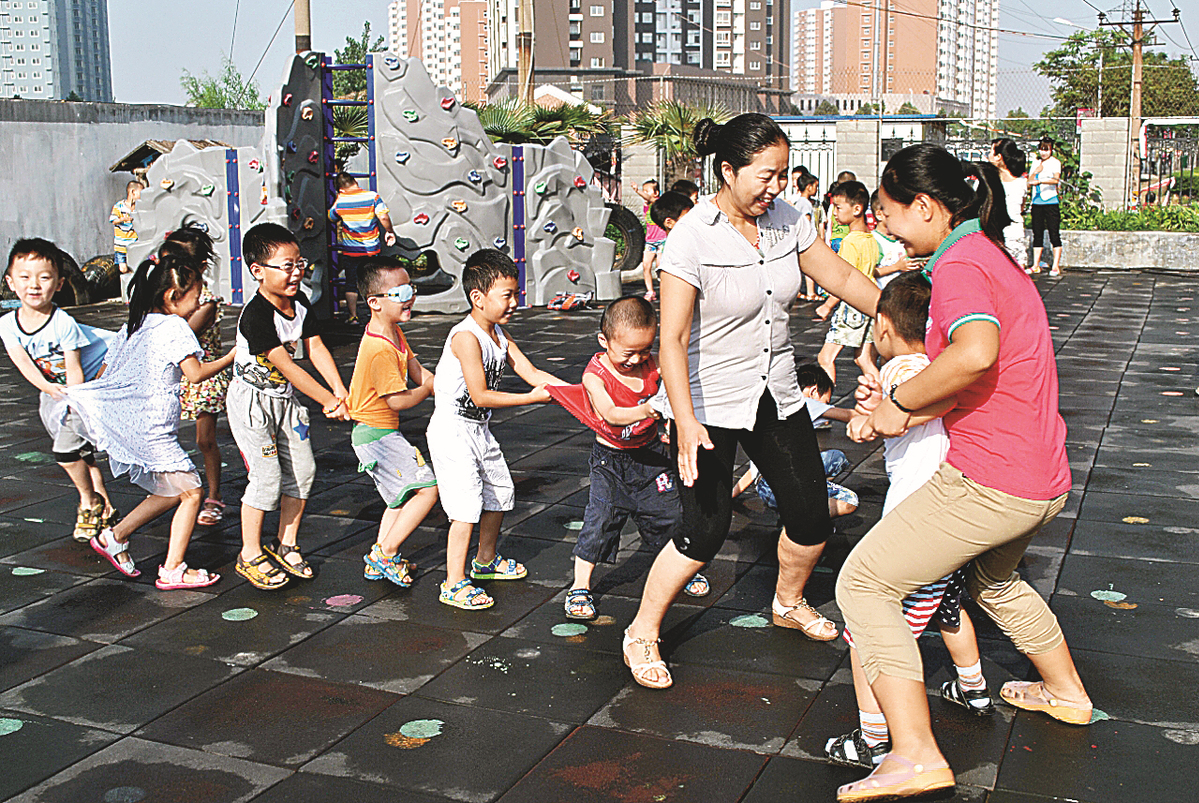Kindergarten helps promote drive for inclusive education


Qisehua, in Henan province, has a long history of teaching children with special needs alongside their nondisabled peers. Li Hongyang reports.
For her son's preschool and nine years of compulsory education, Niu Nana insisted on finding places at nonspecialist schools instead of dedicated establishments for the boy. Her son, He Xin, was born with a visual impairment, cerebral palsy and other conditions.
The 50-year-old mother from Zhengzhou, capital of Henan province, said she made the right decision all those years ago. Her 26-year-old son not only works at a property management company with nondisabled colleagues, but he was also able to take good care of her when she had to be hospitalized.
"He has a strong sense of responsibility in his work. He even stuck to his post on July 21, when once-in-a-decade torrential rain hit Zhengzhou," Niu said.
In 1999, she sent He to a kindergarten in the city that was affiliated to the hotel where her husband worked. However, she was forced to take the boy out of school after just two weeks because some parents were afraid that their children might become infected with eye problems.
"I burst into tears when my son's teacher told me about the school's decision. I didn't want to put the teacher in a dilemma, so I agreed to remove He Xin. My self-confidence plummeted, and I became more concerned about negative comments or curious glances," she said.
Her son was born with cerebral palsy as a result of a lack of oxygen during delivery. He also has impaired vision, hearing problems and speech disorders. Niu said that after the birth she lost all confidence when faced with social situations.
"On one occasion, when Xin was about 6 months old, I heard strangers on the street discussing his eyes. I couldn't stop crying," she said.
"Despite my low confidence, I was determined to send him to a regular school. I know my son well. If he had been a total fool, I would never have tried to let him learn new things."
One day, a friend recommended Qisehua, a kindergarten in Zhengzhou that mainly accepts nondisabled children but also provides places for some with special needs, who account for about 12 percent of the total.
At first, Niu picked up her son immediately after class and took him home as quickly as possible so he would not play with the other children.
"I was afraid we would get curious looks from the other children and their parents," she said.
Later, though, she was reassured by the work of the kindergarten's teachers. "They patiently taught him how to read and pronounce words. The other children also played with him after class. Just six months later, my son could express himself clearly," Niu said. "Without the teachers' help, he would not have been able to attend regular elementary and middle schools or find a job."
In 2011, she swapped her role as a housewife to take a job with the kindergarten's adult department-an unusual addition for such an establishment-instructing people with special needs on activities such as community service or housework.
"Initially, my family was worried about my safety, but I have never been physically hurt by anyone. I came here to work because I want to help more parents like me," she said.
- China's CR450: A new era of high-speed rail at 400 km/h
- TAN SUO SAN HAO to pioneer future of deep-sea exploration
- Xi's discourses on Chinese modernization published in Japanese
- Officials summoned over alleged garbage bin food served to students
- Caring hearts help to enhance quality special education
- Xi sends condolences to South Korean acting president over plane crash




































